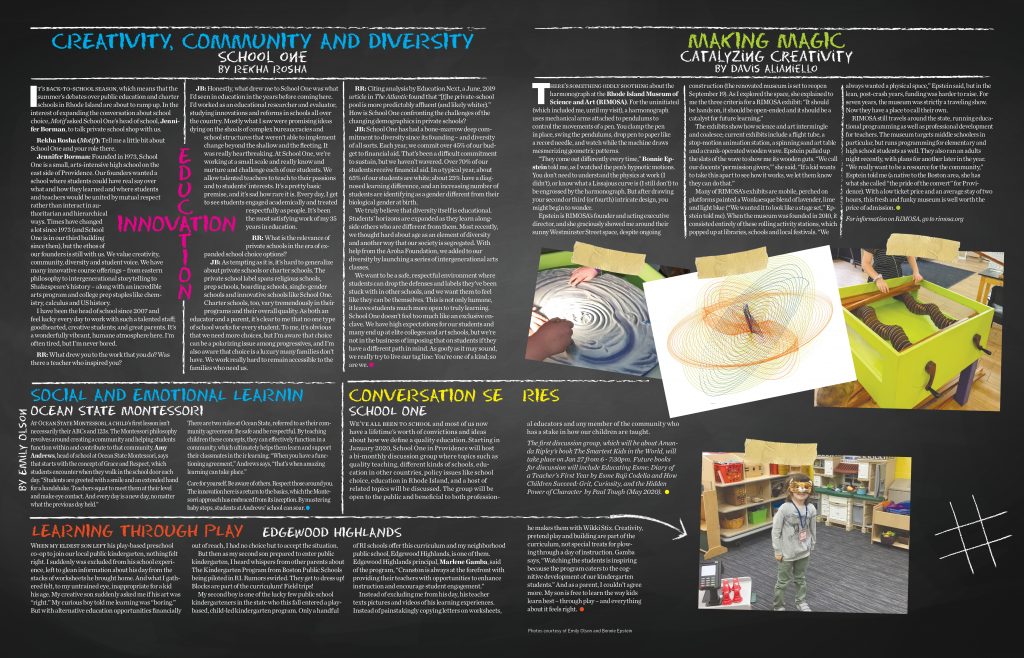It’s back-to-school season, which means that the summer’s debates over public education and charter schools in Rhode Island are about to ramp up. In the interests of expanding the conversation about school choice, Motif asked School One’s head of school, Jennifer Borman, to talk private school shop with us.
Rekha Rosha (Motif): Tell me a little bit about School One and your role there.
Jennifer Borman: Founded in 1973, School One is a small, arts-intensive high school on the east side of Providence. Our founders wanted a school where students could have real say over what and how they learned and where students and teachers would be united by mutual respect rather than interact in authoritarian and hierarchical ways. Times have changed a lot since 1973 (and School One is in our third building since then), but the ethos of our founders is still with us. We value creativity, community, diversity and student voice. We have many innovative course offerings – from eastern philosophy to intergenerational storytelling to Shakespeare’s history – along with and incredible arts program and college prep staples like chemistry, calculus, and US history.
I have been the head of school since 2007 and feel lucky every day to work with such a talented staff; goodhearted, creative students; and great parents. It’s a wonderfully vibrant, humane atmosphere here. I’m often tired, but I’m never bored.
RR: What drew you to the work that you do? Was there a teacher who inspired you?
JB: Honestly, what drew me to School One was what I’d seen in education in the years before coming here. I’d worked as an educational researcher and evaluator, studying innovations and reforms in schools all over the country. Mostly what I saw were promising ideas dying on the shoals of complex bureaucracies and school structures that weren’t able to implement change beyond the shallow and the fleeting. It was really heartbreaking. At School One, we’re working at a small scale and really know and nurture and challenge each of our students. We allow talented teachers to teach to their passions and to students’ interests. It’s a pretty basic premise, and it’s sad how rare it is. Every day, I get to see students engaged academically and treated respectfully as people. It’s been the most satisfying work of my 35 years in education.
RR: What is the relevance of private schools in the era of expanded school choice options?
JB: As tempting as it is, it’s hard to generalize about private schools or charter schools. The private school label spans religious schools, prep schools, boarding schools, single gender schools and innovative schools like School One. Charter schools, too, vary tremendously in their programs and their overall quality. As both an educator and a parent, it’s clear to me that no one type of school works for every student. To me, it’s obvious that we need more choices, but I’m aware that choice can be a polarizing issue among progressives, and I’m also aware that choice is a luxury many families don’t have. We work really hard to remain accessible to the families who need us.
RR: Citing analysis by Education Next, a June, 2019 article in The Atlantic found that “[t]he private-school pool is more predictably affluent (and likely whiter).” How is School One confronting the challenges of the changing demographics in private schools?
JB: School One has had a bone-marrow deep commitment to diversity since its founding – and diversity of all sorts. Each year, we commit over 45% of our budget to financial aid. That’s been a difficult commitment to sustain, but we haven’t wavered. Over 70% of our students receive financial aid. In a typical year, about 65% of our students are white; about 25% have a diagnosed learning difference, and an increasing number of students are identifying as a gender different from their biological gender at birth.
We truly believe that diversity itself is educational. Students’ horizons are expanded as they learn alongside others who are different from them. Most recently, we thought hard about age as an element of diversity and another way that our society is segregated. With help from the Aroha Foundation, we added to our diversity by launching a series of intergenerational arts classes.
We want to be a safe, respectful environment where students can drop the defenses and labels they’ve been stuck with in other schools, and we want them to feel like they can be themselves. This is not only humane, it leaves students much more open to truly learning. I can’t speak for what the trends are in other private schools, but School One doesn’t feel too much like an exclusive enclave. We have high expectations for our students and many end up at elite colleges and art schools, but we’re not in the business of imposing that on students if they have a different path in mind. As goofy as it may sound, we really try to live our tag line: You’re one of a kind; so are we.




